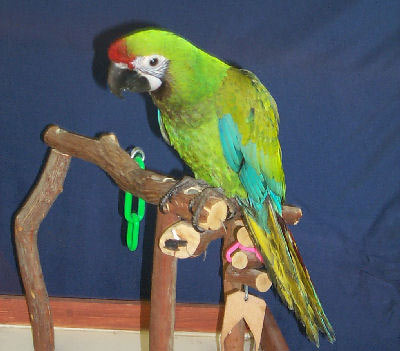
This by far is the most expensive and almost guaranteed to have major problems and issues. It is definitely true that a Macaw parrot can make noise, but it is not often, and not without some reason to be loud. Usually, if they make a loud squawking noise if they sence something to be wrong or different. Maybe a car they don't recognize is coming to the home or the dog is bothering it. They are also known to make a large noise for about 10 minutes as the sun is setting. This is an alert to their flock to settle in for the evening. But with the military macaw these events and noises seem to happen continuously almost all of the time. A pet Macaw when well cared for will seldom become ill. Yet they can contract some diseases, and there some also things in the environment that can cause illness. Behavior problems can also occur, resulting in feather plucking, biting, and loud screeching. Though it is often difficult to determine illness, some visible signs of illness to be aware of are:
- Ruffled plumage
- Drooping wings
- Sagging body
- Extreme mood changes
- Having no appetite
- Bulges in feathering
- Partially closed or watery eyes
- Swelling of the eyelids
- Rasping
- Difficulty breathing
- Excessive saliva
- Dirty vent
- Any change in the feces not apparently diet related
- Proventricular Dilation disease (Macaw wasting disease)
- Psittacosis (chlamydiosis or parrot fever)
- Bacterial, viral, or fungal infections
- Feather picking - results of boredom, poor diet, sexual frustration, and lack of bathing
- Allergies
- Chewing flight and tail feathers by juveniles
- Beak malformations in chicks
- Papillomas
- Kidney disease (gout)
- Toxicity - heavy metal poisoning
- Lipomas in older birds



No comments:
Post a Comment